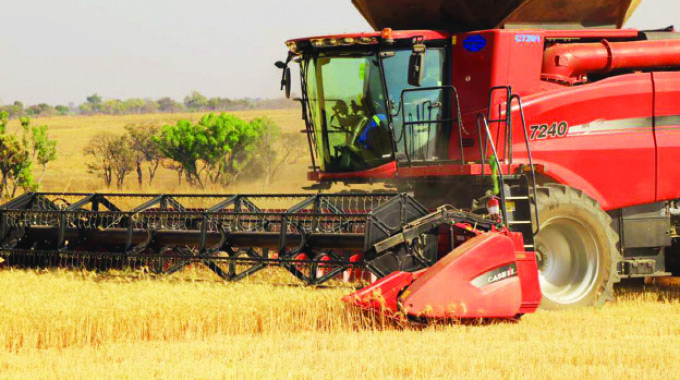Source: All in place for wheat harvesting | The Herald
Elita Chikwati-Senior Agriculture Reporter
Preparations for the harvesting of the 2021 winter wheat crop are in place with stakeholders working closely to ensure a smooth operation.
This season the Government through the Agricultural Finance Company (AFC) Leasing Company and the private sector will assist farmers with combine harvesters.
About 66 000 hectares were put under wheat during the 2021 winter wheat season.
This is third highest hectarage since Independence.
Zimbabwe Farmers Union director, Mr Paul Zakariya confirmed that all systems were in place for harvesting.
Mr Zakariya
He said stakeholders were meeting fortnightly to strategise and ensure smooth harvesting.
“The plan for harvesting is there for the first time in so many years. There is a plan for combine harvesters from the private sector and the AFC facility. We are aware of the regions that produced wheat and the expected dates for harvesting. We have a plan for harvesting and scheduling.
“The issue of combine harvesters is well divided between the Government funded sector and private sector. Things are well organised this season. We may encounter challenges, but so far all is in place,” he said.
Zimbabwe Commercial Farmers Union president Mr Shadreck Makombe concurred with Mr Zakariya that there is an improvement in the preparations for harvesting wheat this season.
“There is quite an improvement this season because of the leasing company. AFC Leasing Company has got combine harvesters at its disposals and we also have individuals who will also come on board.
“We urge farmers to come into clusters to reduce costs of transporting the combine harvesters to the farms.
“This season the wheat was planted at different times and this will reduce pressure on the combine harvesters” he said.
Ministry of Lands, Agriculture, Water and Rural Resettlement, Agritex chief agronomist, Mrs Rutendo Nhongonhema said some farmers had started harvesting.
Some few farmers have started harvesting their crop while most farmers are expected to harvest in October.
Mrs Nhongonhema said the heat crop was in different stages of development with the early planted ready for harvesting.
“A preliminary analysis of the data received from the provinces shows that peak harvesting period for all provinces will be in October, she said.
For Mashonaland West, 5 percent of the crop is expected to be harvested between the first and second weeks of September while 40 percent will be harvested end of September, 45 percent second week of October and 10 percent in the last 10 days of October.
Mashonaland East farmer are expected to harvest 5 percent of the crop beginning mid-September, 10 percent end of September while 20 percent will be harvested during the first week of October. 25 percent of the wheat was excepted to be harvested starting mid-October while 10 percent will be harvested during beginning of November.
Mrs Nhongonhema said in the Midlands, 80 percent of the crop was expected to be harvested during the first and second week of October while 10 percent will be harvested in November, 10 percent will be harvested end of September particularly in Sherwood, Kwekwe.
Matabeleland North wheat farmers are expected to start harvesting end of September. Fifty percent of the crop will be harvested end of October and 10 percent in November.
“Masvingo will have 10 percent of the wheat harvested in September and the rest of the will be harvested in October.
“Matabeleland South all harvesting is expected to come in October,” she said.
The country requires 360 000 tonnes of wheat annually. The largest single harvest in history was in 1990 when 325 000 tonnes were harvested.
This season wheat was produced through a Government guaranteed CBZ Agro Yield programme, private contractors and the Presidential Winter Wheat Scheme.
Last season, farmers produced wheat that is enough to cover nine months’ supply to meet domestic demand, a major jump, with GMB receiving 156 144 tonnes from the farmers it had under contract and around 95 000 tonnes grown by the rest of the wheat farmers to give a total harvest of over 250 000 tonnes.
Newer Post
Covid cases spike in Mberengwa Older Post
All set for Zanu PF polls 

COMMENTS